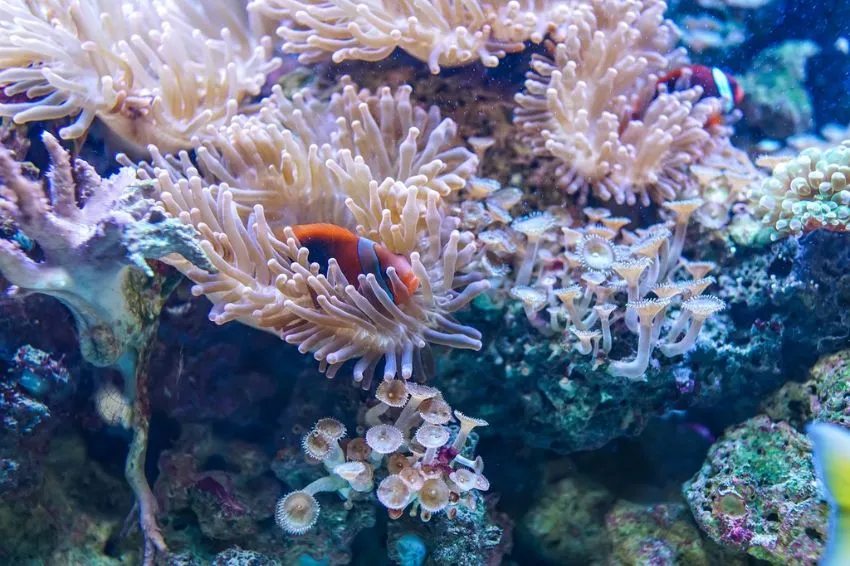Coral reefs are one of the most diverse ecosystems on earth, providing a home for millions of marine species. But have you ever wondered if coral is edible?
Can You Eat Coral?
No, you cannot eat coral. Coral is as hard as a rock, which would be bad for your teeth, esophagus, and digestive system. Many corals also produce toxins that could cause highly detrimental side effects—furthermore, those who’ve tasted coral report that it has a strong, pungent flavor.
Coral is a marine invertebrate that forms a hard skeleton and is an integral part of the marine ecosystem. However, can humans eat coral? The answer is no; humans cannot eat coral.
Coral is not edible for humans because it is as hard as a rock, which would be bad for one’s teeth, esophagus, and digestive system.
Many corals produce toxins that could cause highly detrimental side effects—furthermore, those who’ve tasted coral report that it has a strong, pungent flavor.
While coral is not edible, it is a popular food source in many cultures. Coral is used in traditional medicine and is believed to have healing properties.
However, there is no scientific evidence to support these claims.
Health Benefits of Eating Coral

Eating coral is not a common practice in most cultures. However, in some parts of the world, it is considered a delicacy and is consumed as a food source. While coral may be a nutritious food source, it poses some potential health risks.
Nutritional Value
Coral is a marine invertebrate that forms a hard skeleton. It is an integral part of the marine ecosystem and provides a home for many fish and other marine creatures. Coral is rich in protein, calcium, and other essential micronutrients.
In many parts of the world, local communities heavily rely on coral reefs for the types of fish, seafood, and shellfish they’re eating.
According to research conducted by Harvard University, coral reefs are a vital source of critical micronutrients like iron, zinc, vitamin A, vitamin B12, and fatty acids.
These nutrients are essential for maintaining good health and preventing chronic diseases. However, it is important to note that the nutritional value of coral may vary depending on the species and location.
Potential Risks
While coral may be a nutritious food source, it poses some potential health risks. Firstly, coral is as hard as a rock, which can be bad for teeth, the esophagus, and the digestive system. Many corals produce toxins that could cause highly detrimental side effects—furthermore, those who’ve tasted coral report that it has a strong, pungent flavor.
In addition, coral reefs are home to a diverse range of marine life, including fish, crustaceans, and other invertebrates. Eating coral may disrupt the marine ecosystem’s delicate balance and adversely affect the environment.
Coral in Different Cultures
Coral has been used for various purposes in different cultures around the world. While some cultures use it for medicinal purposes, others have incorporated coral into their culinary traditions.
Coral in Culinary Traditions
In some cultures, coral has been a food source for centuries. For example, in Okinawa, Japan, coral is a crucial ingredient in a traditional dish called “kohaku-namasu,” a pickled dish made with thinly sliced vegetables and coral.
However, it is essential to note that coral is not widely consumed as a food source due to its toxicity and hard texture.
Coral in Medicinal Practices
In traditional Chinese medicine, coral has been used for its medicinal properties. It is believed to have anti-inflammatory and pain-relieving properties.
It treats various ailments like arthritis, bone fractures, and skin disorders.
Coral is also believed to have a calming effect on the mind and is used to treat anxiety and insomnia.
However, it is essential to note that there is limited scientific evidence to support these claims, and the use of coral in medicinal practices is controversial due to the potential harm it can cause to coral reefs.
Environmental Impact of Eating Coral
Eating coral can have significant environmental impacts. Coral reefs are the most diverse ecosystems in the ocean and support a wide range of marine life.
They also provide food, jobs, and protection from storms for coastal communities.
However, coral reefs are threatened by various factors, including overfishing, pollution, and climate change.
Coral reefs are slow-growing organisms and can take hundreds of years to form. When corals are harvested for food, the reef can take decades or even centuries to recover.
The removal of corals can also damage the surrounding ecosystem, as corals provide habitat and shelter for many other marine species.
In addition, the process of harvesting coral can be destructive to the reef. Many harvesting methods involve breaking off pieces of coral, which can damage the surrounding coral and cause it to die, leading to a chain reaction, as the death of one coral can have a ripple effect on the entire ecosystem.
Legalities and Regulations of Eating Coral
While coral might seem like an exotic delicacy, it is essential to understand that eating coral in many parts of the world is not legal. The collection and consumption of coral are highly regulated due to the critical role that coral reefs play in the marine ecosystem.
In the United States, for example, the Coral Reef Conservation Act promotes the wise management and sustainable use of coral reef ecosystems. It provides financial resources to local communities and non-governmental organizations to assist in preserving coral reefs.
In Florida, collecting stony corals, fire corals, and certain octocoral species is prohibited, and the harvest of live rock is illegal unless harvested at a licensed aquaculture area.
Eating coral can also be dangerous to human health. Many types of coral contain toxins known as Palytoxin, which can cause breathing issues, stomach discomfort, and indigestion.
Palytoxin is released as a defense mechanism to deter predators and can harm humans if ingested.
It is important to note that even if coral is legally harvested and deemed safe for consumption, it is not a sustainable food source.
Coral reefs are already threatened due to climate change, pollution, and overfishing; consuming them exacerbates the problem.
Instead, individuals can explore sustainable seafood options that do not harm the marine ecosystem.
FAQ
Here are some frequently asked questions about eating coral:
No, coral is not safe to eat. Corals are living animals that play a vital role in the marine ecosystem. Eating coral would not only harm the coral itself, but it could also have negative impacts on other marine creatures that rely on coral for food and habitat.
While some cultures may use coral in traditional medicine or as a decorative item, there are no known cultures that regularly consume coral as a food source. Coral is simply not a part of the human diet.
Some fish, such as parrotfish, do eat coral as part of their natural diet. However, these fish have specialized teeth and digestive systems that allow them to break down and process the hard coral skeleton. Humans do not have these adaptations and should not attempt to eat coral.
No, coral should not be used in cooking. In addition to being inedible, coral is also a protected species in many parts of the world. Harvesting or using coral for any purpose is illegal in some areas and can result in hefty fines or even imprisonment.





Leave a Reply
You must be logged in to post a comment.